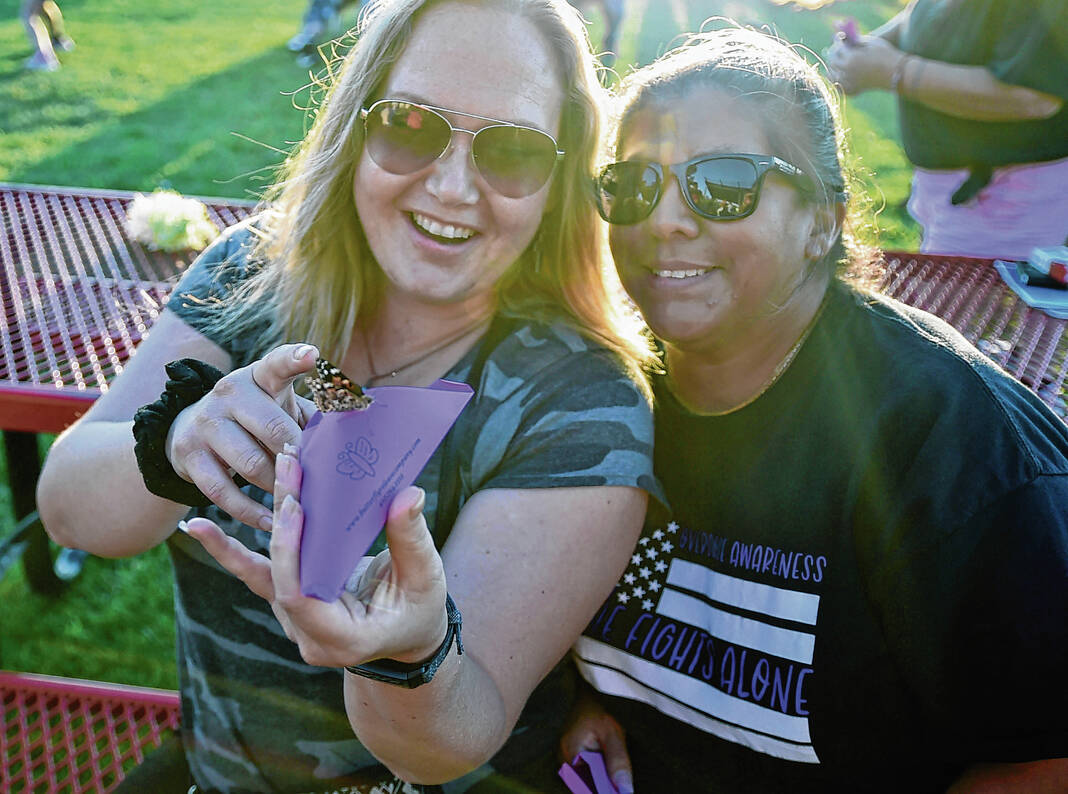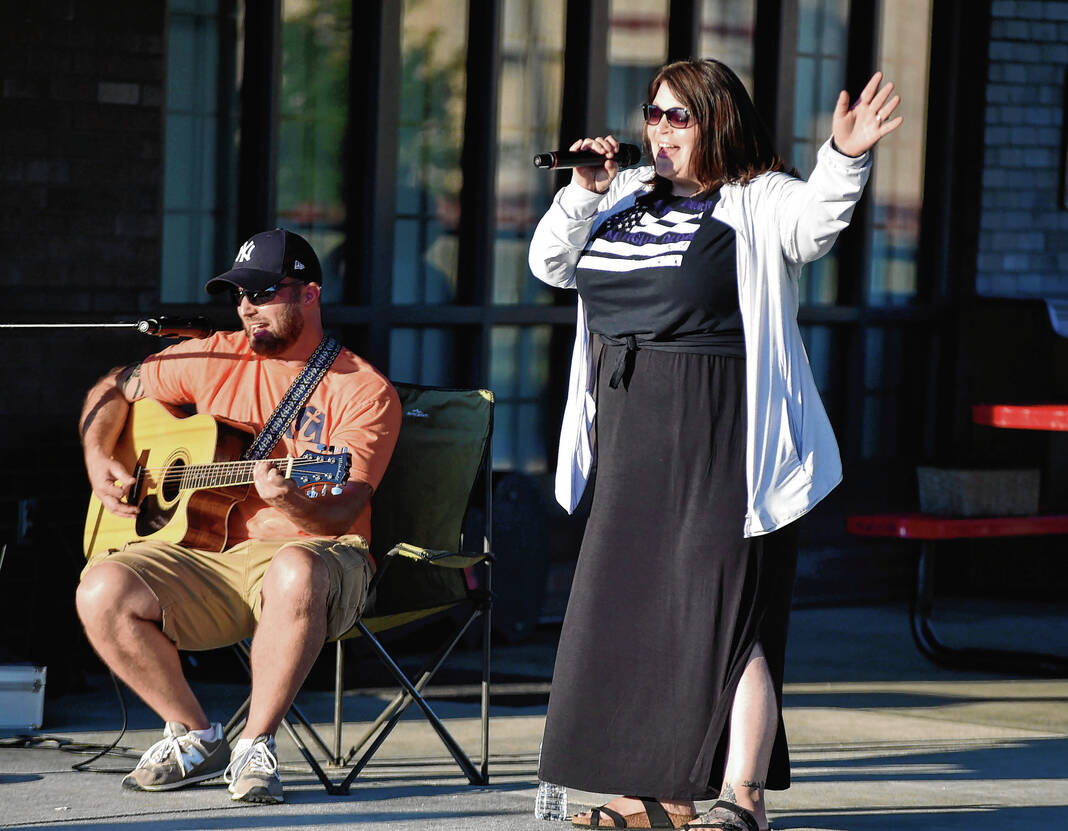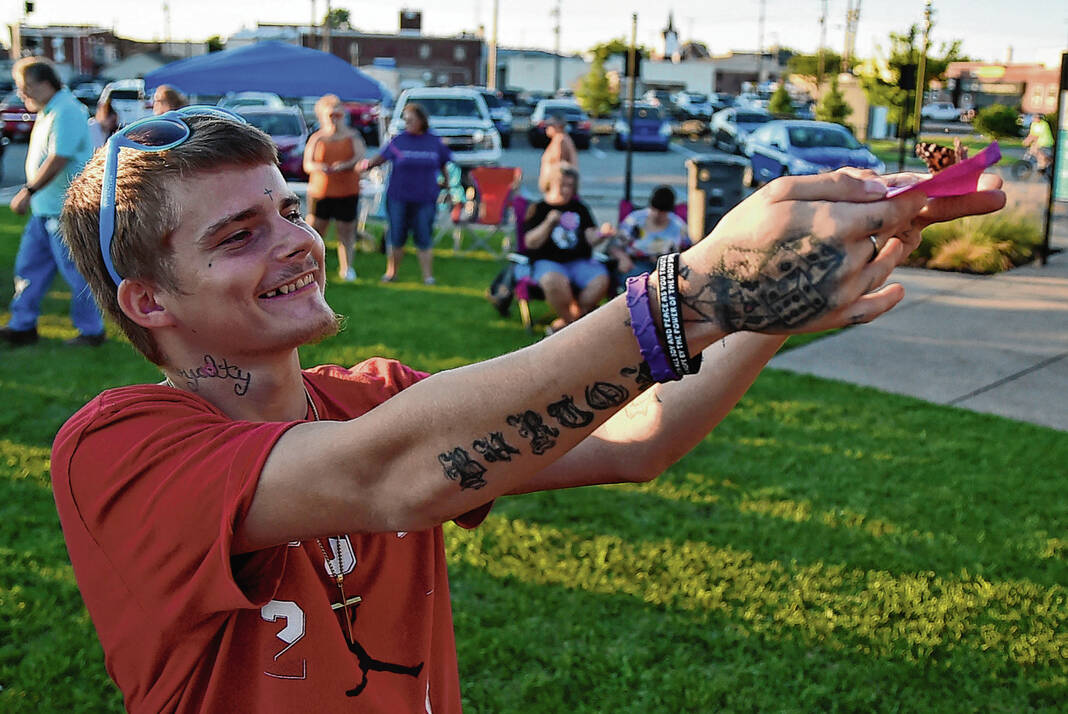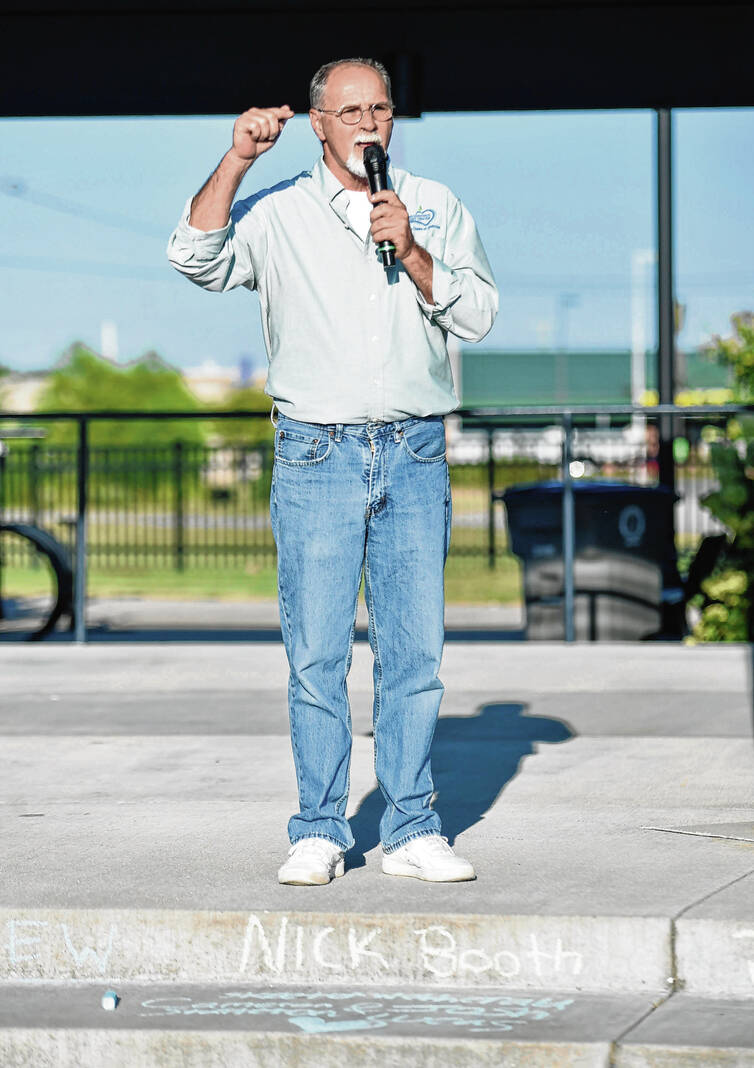John Cunningham was 15 when he woke up one morning to find his father dead on the kitchen floor from a massive heart attack.
His father was his hero, the person he lived to please and who he wanted to be like.
It was really hard for Cunningham because at the time, he didn’t have the tools to deal with something like that. His mother didn’t, either.
A few months later, his mother met another man and moved the family to Brown County. Cunningham lost his social support, and looking back, he said that was a recipe for disaster.
He became involved in the wrong crowd, and they instantly took him in.
“It didn’t take long for my addiction to start, and I’m pretty sure that my addiction started way before I hit my first joint,” he said during Wednesday’s International Overdose Awareness Day event at Crossroads Community Park in downtown Seymour. “I’m pretty sure it started the moment my father died.”
His addiction continued for years, and by 2012, he was breaking into homes to support his habit.
“I got busted multiple times. Columbus was fed up with me,” he said.
Finally, his “I’m done with this” moment came when he received notice in the mail that he was facing 30 years in prison.
“I don’t know about you, but that scared me to death,” Cunningham said. “I realized that if the drugs weren’t going to kill me, the system was definitely going to take me. I had to make a decision.”
He realized he had to do the next right thing. At that time, recovery treatment centers weren’t available locally when he was released from the Bartholomew County Jail, but he started doing small things he had never done before and had a desire to change. That led him down the right path.
“When you do the small things, I swear to you God shows up and does the big things,” Cunningham said. “I should not be here talking to you today. I have no reason to be here, but I am. I didn’t do that. All I did was start accepting my situation, started trying to get happy and caught this little glimmer of hope, and it was small back then. Something inside me said, ‘Maybe you can die sober.’”
That was a goal, a purpose and something that gave him meaning in the darkest points of his life.
“That purpose, that little bit of hope, it just shined to do the next right thing,” he said. “I swear to you it has broken down every barrier I’ve ever had.”
Despite being a three-time felon, he never had a problem finding a home or employment. At one point, he walked to work at McDonald’s at 5 a.m., and that was the next right thing he could do.
“Doing that, I ended up getting good references from McDonald’s that led me to the jobs I have today, which led me to the life I have today,” he said.
In April 2018, he founded Recover Out Loud Inc., based on the concept of the psychological study of “Rat Park” to utilize connection and motion to recover from addiction. In October 2019, it became a 501(c)(3) nonprofit organization serving six counties in south central Indiana that strives to create an environment that is inclusive to all paths of recovery, striving to long-term sobriety with a holistic approach.
Along with being president of that organization and running five meetings on a weekly basis, Cunningham is celebrating 10 years of continuous sobriety. That drew a round of applause from the crowd gathered Wednesday night.
“The best message I know to give is to make sure you do that next right thing, to not get discouraged,” he said. “Life’s hard. Things happen. Show up to your meetings, whatever it is that you do to recover. Make sure that you keep doing that, and life definitely gets better. I love that I get to see when people recover and I get to see them come back to life. It’s amazing.”
It was important for Cunningham to attend Wednesday’s event because he said it lets him know why he’s still fighting that fight.
“Every now and then, you feel like you’re surrounded by all of the goodness, especially when you’re going to the meetings and I come to these events,” he said. “Then you get to overdose awareness walks, you realize there’s still a gigantic fight to keep fighting. We have to keep showing up and keep doing this for the next person to recover and to be that light and that hope.”
Several others spoke during Wednesday’s event.
Kimberly Glaze, director of program development for the Jackson County Recovery Program, talked about the new initiative that involves meeting with community leaders, local, state and national recovery organizations and programs, law enforcement, criminal justice, health care, housing and mental health to assess the level of resources offered here and identify needs not being addressed or underserved.
Based on the information gathered, program leaders will make recommendations and answer questions about the need for an ongoing county recovery program.
Next up was Dr. Ryan Sarver, a family physician in Seymour specializing in addiction medicine and medication-assisted treatment for opioid use disorder. He talked about the generational trauma and mental health issues associated with substance use but said there is hope locally with what’s being done in his office and elsewhere in the county to help people.
“There’s treatment for your mental health and your trauma. We will help you through that. We have treatment available,” he said. “There is hope. It can end. It’s got to end with us.”
New Beginnings Recovery Center in downtown Seymour is among those helping people with mental health and addiction, and founders Michael and Teresea Higham also spoke Wednesday night.
Michael said he is celebrating 13 years of recovery after “35 years of destruction and pain” put on his family. He’s glad to be one of the local resources available locally.
“If we can get to a place where our mental health is strong, where we can believe in ourselves again, we can recover,” he said. “When we feel that way about ourselves, the need to use goes away on its own. We only use to feel different. … When we get to a point where we are OK with how we feel today, we’re going to be just fine. We’re going to make it. If you can feel better today, you’ve got a head start on tomorrow.”
Stacy Findley of Seymour was next to speak, sharing the story of her younger brother, Clint Noble, who died May 2, 2021, from a fentanyl overdose. He was 34.
She was accompanied onstage with a suitcase with the words sadness, guilt, trauma, regret, anxiety, depression and shame on pieces of paper. That represented the baggage she has been carrying around since her brother’s death.
Noble started dealing drugs in fifth grade and spent time in juvenile detention centers, and after he graduated from high school, he struggled with anxiety and depression and used drugs to numb feelings and deal with his pain, Findley said.
He was a personal trainer and a minor league baseball umpire traveling all over New York until he found out his girlfriend was pregnant, and then he came back home to Indiana to be a family man.
He went to barber school and opened his own shop in downtown Columbus, serving up haircuts and craft beer.
“Which would be a great idea, except for the fact that he struggled with addiction and was surrounded by people drinking alcohol all day,” Findley said.
Along with drinking there all day, he began to use pills to treat back pain, and one thing led to another, Findley said. He began having run-ins with the law, his addiction started to take ahold of him and he was unable to control it.
After five years, the barber shop closed. Noble’s offenses became more severe, he overdosed on multiple occasions and had to be revived, including one time when his father was driving him to a court appearance, and he was facing about 18 months in jail.
A week away from his sentencing date, he died from an overdose.
“In my head, I was trying to wrap my brain around it because I was like, ‘If he could just get to prison, he would be clean and sober,’” Findley said. “Prison was going to fix him, but he didn’t make it.”
Findley said she has found peace because for the first time since he was 10, her brother is not “a slave to the addiction.” Still, though, she and her family experience a variety of emotions from the loss of a loved one.
Also Wednesday night, community resources, including free Narcan, were available, The Alley provided free food and Kaelin and Daniel Grube, Dustin Vice and Jennifer Hopkins performed live music.
The two-hour event concluded with The Alley handing out sobriety birthday coins to people celebrating anywhere from 30 days to several years of sobriety.
“We’re very happy to be up here tonight and very honored to be able to not only remember the ones that we have lost but also celebrate clean time,” Sara Bowling with The Alley said.












